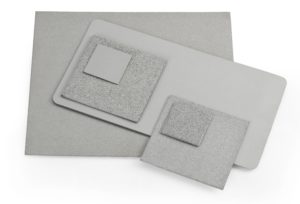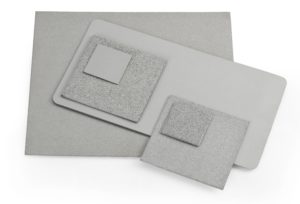Fuel Cells Technology
Mott collaborates closely with numerous fuel cell manufacturers in the area of gas diffusion layers. Mott components are optimized to enhance transport, reduce ohmic resistance, and maximize catalyst utilization. Our tailored porous metal sheet solutions come in various thicknesses and porosity levels, ensuring optimal permeability and conductivity. We offer titanium sheet for PEM applications, in addition to 430 stainless steel and nickel 200 for alkaline or solid oxide technologies. For aerospace applications, we also provide specialty alloys like niobium and zirconium.
Questions? Call 860.747.6333 Today!
Related Resources
Typical Applications:
- Hydrogen Generation
- On-site Gas Generation
- Hydrogen Storage
Gas Diffusion Layers
Mott porous metal gas diffusion layers are the leading choice for high performance electrolyzer and fuel cell applications.
Titanium Sheet Quality Standards
Mott employs the most stringent criteria for its ultra-thin titanium sheet used in various sustainability and alternate energy applications.
Lab & Engineering Services
Discover our entire range of services, including rapid prototyping, filter feasibility, media characterization and more.
Explore Mott's Capabilities
Provides an overview of markets served, applications, products, materials, and engineering capabilities.
The Importance of Fuel Cells in Sustainable Energy
Fuel cells are energy conversion devices that produce electricity through a controlled chemical reaction between hydrogen and oxygen, emitting only water and heat as byproducts. They are crucial for a sustainable future as they offer efficient, clean, and environmentally friendly power generation, suitable for a wide range of applications, including transportation, stationary power, and portable electronics. Mott excels in providing components for fuel cells due to our extensive experience in designing and manufacturing specialized porous materials including gas diffusion layers (GDLs) and bipolar plates. These components are essential for optimizing fuel cell performance, ensuring efficient reactant distribution, heat management, and corrosion resistance, making Mott a leader in supporting the advancement of fuel cell technology.
FAQs: Fuel Cells
Q: What are fuel cells?
A: Fuel cells are electrochemical devices that convert the chemical energy of a fuel, typically hydrogen, into electricity through a controlled chemical reaction with oxygen or air. They provide a clean and efficient way to generate electricity with minimal emissions.
Q: Where are fuel cells used?
A: Fuel cells have a wide range of applications, including powering vehicles (fuel cell vehicles or FCVs), providing backup power for critical infrastructure, and serving as a primary or auxiliary power source for various industries such as aerospace, telecommunications, and more.
Q: What are the benefits of using fuel cells?
A: Fuel cells offer several advantages, including high energy efficiency, reduced greenhouse gas emissions, quiet operation, and the potential for clean, sustainable energy production. They can provide reliable power in remote or off-grid locations and play a vital role in achieving environmental sustainability goals.
Q: How does Mott contribute to fuel cell technology?
A: Mott Corporation is a leading provider of specialized components for fuel cells, including gas diffusion layers, bipolar plates, and balance of plant components. These components enhance the performance and durability of fuel cell systems, making them attractive for adoption in various applications.
Q: Can Mott customize fuel cell components?
A: Yes, Mott offers customization options for fuel cell components. They can tailor the components to meet specific requirements, ensuring optimal performance in different fuel cell applications. Customization may include variations in thickness, porosity, and materials to match the unique needs of customers.

